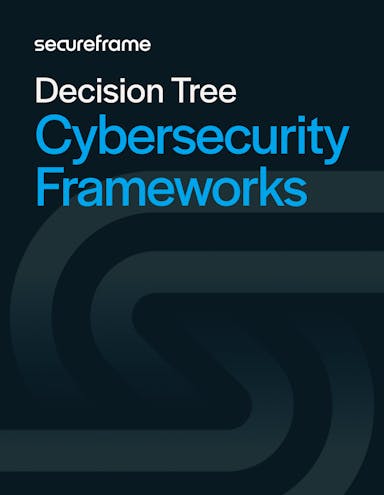
The Top 10 Benefits of Managed Security Services
Anna Fitzgerald
Senior Content Marketing Manager
Aaron Melear
VP of Partnerships and Alliances
Cyber threats are becoming more sophisticated, and businesses of all sizes face increasing risks. Managed security services (MSS) provide organizations with third-party expert security support to protect their networks, data, and systems.
By outsourcing security operations to a managed security service provider (MSSP), businesses can enhance their security posture while saving time and resources that can be used for core objectives, like developing new products and services or enhancing the customer experience.
Below we’ll provide a definition of managed security services and then dive into the key benefits of outsourcing security and compliance.
What are managed security services?
Managed security services (MSS) involve outsourcing cybersecurity and compliance functions to a third-party provider. An MSSP typically provides a wide range of services, including continuous monitoring, threat detection, incident response, compliance support, risk management, security consulting, and vulnerability scanning, among others.
MSSPs use expertise and advanced security tools to provide these services and help businesses defend against evolving cyber threats.
By leveraging managed security services, organizations can access enterprise-grade security without the need for in-house resources. This approach is especially beneficial for small to mid-sized businesses (SMBs) that may lack the budget or personnel to build an internal security team. Let’s take a closer look at the benefits below.

Recommended reading

The Ultimate Guide to MSSPs vs In-House SOCs: Costs, Benefits, and How to Decide
Benefits of managed security services
Here are the major benefits of using managed security services to safeguard your business against evolving threats:
1. 24/7 monitoring and threat detection
MSSPs offer round-the-clock monitoring to detect and respond to threats in real time, minimizing the risk of data breaches and cyber incidents. This proactive approach ensures that even sophisticated attacks are identified and mitigated before they can cause significant damage.
For example, an e-commerce company experiencing a surge in online traffic may not notice an ongoing distributed denial-of-service (DDoS) attack. With an MSSP in place, security teams can detect the attack instantly and implement countermeasures to prevent website downtime and revenue loss.
2. Access to cybersecurity expertise
Hiring and retaining in-house security experts can be costly and challenging. MSSPs provide access to a team of skilled security professionals with extensive knowledge of the latest threats, compliance requirements, and best practices. These experts stay updated on emerging cyber threats, ensuring businesses receive top-tier protection.
A healthcare organization handling sensitive patient data, for example, might struggle to keep up with evolving HIPAA compliance standards. An MSSP offering compliance-as-a-service can help drive their continuous compliance strategy by implementing necessary security measures and training staff on best practices.
3. Access to advanced technologies
MSSPs provide businesses with access to the latest security technologies, including advanced firewalls, endpoint detection and response (EDR), security information and event management (SIEM) systems, and artificial intelligence-driven compliance management software. These cutting-edge tools help organizations stay ahead of cybercriminals and regulations and mitigate threats and compliance risks before they escalate.
For example, an MSSP can deploy a compliance automation solution that generates gap assessment reports, continuously monitors security controls, and streamlines compliance workflows for frameworks like CMMC, SOC 2, ISO 27001, and HIPAA. Doing so can help businesses reduce the risk of human error, save time, and ensure they remain compliant with evolving regulatory requirements.
4. Cost-effective security solutions
Building and maintaining an in-house security team requires significant investment in personnel, training, and technology. MSSPs can offer scalable security solutions at a fraction of the cost, making enterprise-level security accessible to businesses of all sizes.
For instance, a small e-commerce business might not have the budget to hire a full-time security professional or invest in advanced cybersecurity tools. By partnering with an MSSP, they gain access to state-of-the-art security technologies and expertise without the financial burden of hiring and maintaining an internal department.
5. Advanced threat intelligence and analytics
MSSPs leverage cutting-edge technologies, such as artificial intelligence and machine learning, to analyze vast amounts of security data. This helps businesses stay ahead of emerging threats and improve their security defenses proactively.
A financial services firm, for example, can benefit from AI-driven threat detection that identifies unusual transaction patterns indicative of fraud. By using an MSSP's advanced analytics, the firm can prevent unauthorized transactions before they result in financial losses or reputational damage.
6. Compliance support
Many industries must comply with strict regulations and standards, such as GDPR and PCI DSS. MSSPs help organizations meet compliance requirements by implementing necessary security controls, conducting audits, and generating reports.
For example, a SaaS company processing credit card payments must comply with PCI DSS standards to protect customer data. An MSSP can help ensure that the company’s security infrastructure meets these requirements, reducing the risk of non-compliance and enhancing customer trust.
7. Rapid incident response and remediation
A quick response is critical in minimizing the impact of security incidents. MSSPs provide rapid detection, containment, and remediation services to mitigate risks and ensure business continuity. If a ransomware attack encrypts an organization’s critical files, an MSSP can swiftly isolate the affected systems, initiate recovery protocols, and prevent the malware from spreading.
A law firm dealing with sensitive client data, for instance, would greatly benefit from such rapid response capabilities, minimizing data exposure and legal repercussions.
8. Scalability and flexibility
As businesses grow, so do their security needs. MSSPs offer scalable security solutions that can adapt to evolving business requirements, ensuring continued protection as operations expand.
A startup that initially requires only basic endpoint protection might later need advanced security solutions, such as intrusion detection and incident response. With an MSSP, the company can scale its security services as needed without investing in new infrastructure or hiring additional personnel.
9. Improved focus on core business operations
Managing security in-house can divert valuable time and resources away from core business activities. By outsourcing security to an MSSP, organizations can focus on growth and innovation while ensuring robust cybersecurity.
For example, a manufacturing company may struggle to allocate IT staff to security tasks while also managing production systems. By relying on an MSSP, they can ensure their networks and data remain secure while dedicating their internal resources to improving operational efficiency and product development.
10. Peace of mind
Cybersecurity is a complex and ever-changing field, and managing it internally can be overwhelming. Partnering with an MSSP allows organizations to offload security concerns to experts, ensuring they have a proactive strategy in place to handle potential threats. This peace of mind allows business leaders to focus on growth, innovation, and operational priorities without constantly worrying about data breaches or compliance violations.
Whether it’s a small business owner or an enterprise IT leader, knowing that a dedicated team is monitoring and protecting critical assets 24/7 provides invaluable reassurance.
Recommended reading

Cybersecurity Explained: What It Is & 13 Reasons Cybersecurity is Important
How to decide whether you should outsource security
Deciding whether to outsource security is a critical choice for organizations of all sizes and industries. While some companies may prefer to maintain an internal security team, others benefit from the expertise, scalability, and cost-efficiency of a managed security service provider. Below are some common factors that organizations should consider when determining if outsourcing security is the right move.
1. You’re facing increasingly sophisticated threats.
One of the most significant reasons organizations choose to outsource security is the increasing frequency and complexity of modern cyber threats. Cybercriminals are continuously evolving their tactics, requiring businesses to stay ahead with advanced defenses. Companies that lack the internal resources to monitor and respond to threats 24/7 may find that partnering with an MSSP provides essential expertise and real-time protection.
While this is important for organizations of all types, sizes, and industries, this is particularly important for certain industries like manufacturing where cyberattacks are surging the most. Research from Check Point revealed there was a 75% surge in global cyber attacks during the third quarter of 2024, with the manufacturing sector hit hardest by ransomware.
2. You’re facing increasing regulatory scrutiny.
Regulatory compliance is another key consideration. Industries such as healthcare, finance, and retail face stringent regulations and standards such as HIPAA, PCI DSS, GDPR, and ISO 27001. Organizations that struggle to navigate compliance requirements or lack the internal expertise to maintain security controls effectively may benefit from outsourcing security to professionals who specialize in meeting regulatory obligations.
3. You’ve been impacted by a security breach or had a close call.
Organizations that have experienced a security breach or a close call may also find that outsourcing security helps them strengthen defenses and implement a more proactive cybersecurity strategy. An MSSP can provide incident response support, risk assessments, and continuous monitoring to prevent future incidents.
4. You’re struggling with budget and headcount constraints.
Budget constraints and resource limitations often drive companies to consider outsourcing security. Hiring and retaining an in-house cybersecurity team can be expensive, especially when factoring in salaries, training, and technology investments. MSSPs offer a cost-effective alternative, allowing businesses to access top-tier security solutions without the overhead of building an internal team.
5. You’re in a period of rapid growth or change.
Companies undergoing rapid growth, mergers, or expansions may also benefit from outsourcing security. As organizations scale, their security needs evolve, and an MSSP can provide the flexibility needed to adapt quickly. Whether entering new markets, integrating new technologies, or managing third-party vendors, an MSSP helps businesses stay secure without slowing down progress.
If you're still unsure whether outsourcing security is the right choice for your organization, consider these questions:
- Do we have the in-house expertise to manage cybersecurity effectively?
- Are our IT staff overwhelmed with security responsibilities in addition to their core duties?
- Are we able to provide 24/7 monitoring and rapid incident response?
- Do we have a clear and effective cybersecurity strategy?
- Are we struggling to meet compliance requirements for regulations like HIPAA, PCI DSS, or GDPR?
- Have we experienced security breaches or incidents in the past, and were we able to respond effectively?
- Are we confident in our ability to detect and mitigate cyber threats proactively?
- Do we have the resources to invest in the latest security technologies and tools?
- Are we undergoing business expansion, mergers, or rapid growth that increases our security needs?
- Are we looking for a cost-effective way to enhance our cybersecurity program without hiring a full in-house team?
By answering these questions, organizations can assess whether outsourcing security aligns with their needs, risk tolerance, and long-term goals. An MSSP can provide the expertise, scalability, and proactive defense necessary to protect against today’s sophisticated cyber threats while allowing businesses to focus on their core objectives.
Recommended reading

Compliance Outsourcing: New Data Measures the ROI of Compliance Automation and MSSPs
Factors to consider when evaluating managed security services providers
Before choosing an MSSP, businesses should consider several factors to ensure they select the right provider for their needs:
- Business size and security requirements: Determine whether your organization requires full-scale security management or specific services such as compliance support or threat monitoring.
- Technology and integration capabilities: Assess whether the MSSP’s security tools can integrate seamlessly with your existing IT infrastructure.
- Service level agreements (SLAs): Review the provider’s SLAs to understand response times, availability, and the scope of services covered.
- Scalability and flexibility: Ensure the MSSP can adapt to your business’s growth and evolving security needs.
- Reputation and experience: Look for a provider with a proven track record, industry certifications, and positive client reviews.
- Industry compliance needs: If your business operates in a regulated industry, ensure the MSSP has experience with relevant compliance frameworks such as GDPR, HIPAA, or SOC 2.

Cybersecurity Frameworks Decision Tree
With so many cybersecurity frameworks available, understanding the unique strengths and applications of the most common can help guide your or your clients’ selections. This decision tree offers a starting point based on high-level business and geographical questions, helping you suggest frameworks that align with the unique requirements and regulatory obligations of an organization.
How Secureframe can help you find the right MSSP
Managed security services provide businesses with expert protection, cost savings, and enhanced threat detection. By partnering with an MSSP, organizations can more effectively strengthen their security and compliance posture and safeguard their operations from evolving cyber threats.
Investing in managed security services is a proactive step toward a more secure and resilient business environment.
See how Secureframe and its trusted Service Partner network can help you build a more secure and resilient business environment by scheduling a demo today.
Use trust to accelerate growth
FAQs
Why use managed security services?
Managed security services provide businesses with expert cybersecurity protection, reducing the risk of data breaches and ensuring compliance with industry regulations. They help organizations save costs by eliminating the need for an in-house security team while offering 24/7 monitoring, threat detection, and rapid incident response. Businesses can focus on their core operations without worrying about managing complex security challenges.
How does managed security services work?
Managed security services work by outsourcing security functions to a specialized provider. The MSSP continuously monitors networks, detects threats, and responds to incidents in real time. They use advanced security tools, analytics, and threat intelligence to identify vulnerabilities and mitigate cyber risks. Additionally, MSSPs offer compliance support, security audits, and customized security strategies tailored to an organization's needs.
What are managed security service providers used for?
Managed security service providers (MSSPs) are used for comprehensive cybersecurity management. Businesses rely on MSSPs for network security, endpoint protection, vulnerability assessments, incident response, compliance management, and security strategy development. Whether a small business looking for cost-effective security or a large enterprise needing specialized expertise, MSSPs provide scalable solutions to protect against evolving cyber threats.

Anna Fitzgerald
Senior Content Marketing Manager
Anna Fitzgerald is a digital and product marketing professional with nearly a decade of experience delivering high-quality content across highly regulated and technical industries, including healthcare, web development, and cybersecurity compliance. At Secureframe, she specializes in translating complex regulatory frameworks—such as CMMC, FedRAMP, NIST, and SOC 2—into practical resources that help organizations of all sizes and maturity levels meet evolving compliance requirements and improve their overall risk management strategy.

Aaron Melear
VP of Partnerships and Alliances
Aaron Melear served as Vice President of Partnerships and Alliances at Secureframe, where he built and scaled the company’s global partner ecosystem. With over a decade of experience leading channel and alliance programs at top cybersecurity organizations—including Duo Security and Vanta—Aaron is passionate about helping partners accelerate revenue growth through automation, collaboration, and trust. During his tenure, he focused on empowering MSPs, auditors, and consulting partners to deliver faster, smarter compliance outcomes for their clients using Secureframe’s platform.